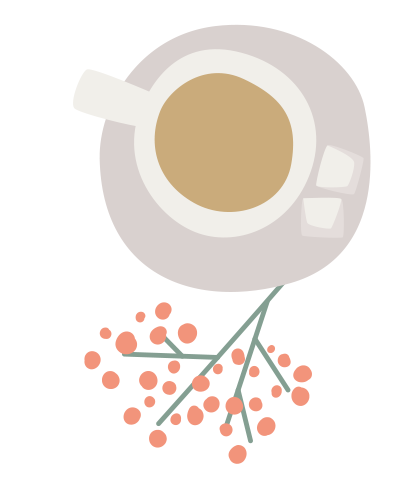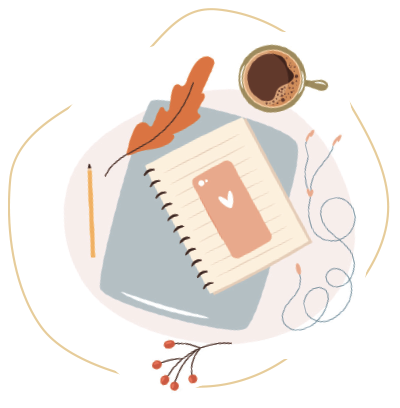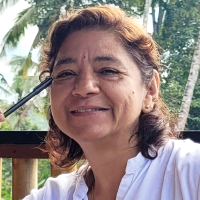Journaling as Awareness, Grounding, and Reflection
Nalini Rajesh shares how journaling serves as a powerful tool for self-discovery and spiritual integration in this excerpt from her upcoming book, The Ink Within.
In a world where speaking is louder than sensing and sharing is quicker than self-reflection, a quiet practice waits almost forgotten: journaling.
Through seasons of stillness, resistance, and discovery, I have learned that journaling goes beyond therapy—it is a ritual that grounds me, an anchor for my soul, and the one place I can hear what I cannot speak aloud.
When pen meets page, the swirls in the mind start taking shape. Thoughts become clearer, feelings softer, and insights find their words. Something in us exhales as our fleeting thoughts and feelings become embodied.

Through seasons of stillness, resistance, and discovery, I
have learned that journaling goes beyond therapy—it is a
ritual that grounds me, an anchor for my soul, and the
one place I can hear what I cannot speak aloud.
Journaling as Awareness
Much of life happens beneath the surface. We react, repeat, and carry emotions we cannot name—and they quietly shape our choices. Journaling slows this current and brings it into the light.
I noticed this in myself: the days I resisted writing were the days I was closest to my truth. On the page, what I avoided—an ache, a fear, a restless loop—revealed itself. And in naming it, the grip loosened.
Science affirms this. Naming an emotion calms the amygdala, the brain’s alarm center. Writing activates the prefrontal cortex, the seat of reflection and wise choice. In short, journaling helps us shift from automatic reaction to conscious response.
A single sentence—“I feel restless”—can change everything. Once written, restlessness is no longer consuming; it is witnessed as something separate from oneself. A new awareness is born.
Journaling as Grounding
Inner experiences can feel vast—deep stillness, sudden clarity, or strong emotion. Without grounding, they may fade or leave us unsettled.
For me, journaling became the way to hold them. Subtle experiences no longer slipped away; they were anchored, seen, and allowed to positively shape me. It is like lightning: when high voltage strikes, we need an earthing or grounding wire to carry the current into the ground safely. Without it, the energy can become destructive. Psychology describes journaling in this way—as a safe discharge, like releasing extra electricity from an overloaded system. It prevents emotional buildup.
At the same time, journaling grounds higher inspirations. When divine guidance or a sudden spark arrives, writing ensures it is not lost. What could remain fleeting takes form as language, memory, and direction.
Thus, journaling steadies both our emotional residue and our subtle inspirations. It carries what feels heavy and anchors what feels light.
Journaling as Reflection
More than awareness and grounding, journaling is a mirror—not for the face we show the world, but for the truths we carry within.
It showed me how easily I could speak of peace while avoiding discomfort, or claim calmness while deeper feelings lingered without acknowledgement. On the page, these patterns became visible.
Reflection gives us a process map. It records the starting point—how we actually felt in a given moment—and allows us to see what shifted and where we reached, whether in meditation, inner work, or daily life. This continuity deepens honesty and self-awareness.

Reflection is not unkind criticism, but compassionate seeing. The journal does not judge or rush us. It simply holds space for whatever arises. Over time, this space becomes sacred. It prevents spiritual bypass—the tendency to use spiritual practices to avoid facing difficult emotions or shadow aspects—and invites integration instead.
A Final Word
Journaling is not merely an act of recording one’s life; it is a tool to integrate one’s life.
Awareness brings the unconscious into light.
Grounding gives form to the subtle.
Reflection connects the starting point, process, and destination.
Without journaling, even elevated experiences may inspire briefly, yet fail to transform daily living. With journaling, however, growth becomes embodied. What is received in silence becomes anchored in expression. What we discover within ourselves can be carried into our choices, relationships, and actions.
Therefore, journaling is not a luxury but a necessity. For anyone walking an evolutionary path—whether through meditation, self-inquiry, or other practices—it becomes an essential bridge. It ensures that what is glimpsed inwardly is also lived outwardly.
Journaling is the link between inner work and outer living—the forgotten art that makes our journey whole.

Three Journaling Prompts for Daily Use
For awareness: “Right now, I feel…” Write for 5 minutes without editing.
For grounding: After meditation or silence, note what arose, what stayed, and what questions remain.
For reflection: At the end of the day, write one reaction you had and inquire what was beneath it.
Just a few lines each day can shift awareness from fleeting experience to embodied growth.

Nalini Rajesh
Nalini Rajesh is a transformation coach and Heartfulness meditation trainer. Through her initiative, Transformatrix—The Soul Studio, she facilitates journaling circles, quantum resonance trainings, and women’s... Read More

